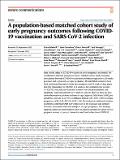Files in this item
A population-based matched cohort study of early pregnancy outcomes following COVID-19 vaccination and SARS-CoV-2 infection
Item metadata
| dc.contributor.author | Calvert, Clara | |
| dc.contributor.author | Carrutherrs, Jade | |
| dc.contributor.author | Denny, Cheryl | |
| dc.contributor.author | Donaghy, Jack | |
| dc.contributor.author | Hillman, Sam | |
| dc.contributor.author | Hopcroft, Lisa EM | |
| dc.contributor.author | Hopkins, Leanne | |
| dc.contributor.author | Goulding, Anna | |
| dc.contributor.author | Lindsay, Laura | |
| dc.contributor.author | McLaughlin, Terry | |
| dc.contributor.author | Moore, Emily | |
| dc.contributor.author | Pan, Jiafeng | |
| dc.contributor.author | Taylor, Bob | |
| dc.contributor.author | Almaghrabi, Fatima | |
| dc.contributor.author | Auyeung, Bonnie | |
| dc.contributor.author | Bhaskaran, Krishnan | |
| dc.contributor.author | Gibbons, Cheryl L | |
| dc.contributor.author | Katikireddi, Srinivasa Vittal | |
| dc.contributor.author | McCowan, Colin | |
| dc.contributor.author | Murray, Josephine-Louise K. | |
| dc.contributor.author | O'Leary, Maureen | |
| dc.contributor.author | Ritchie, Lewis D | |
| dc.contributor.author | Shah, Syed Ahmar | |
| dc.contributor.author | Simpson, Colin R | |
| dc.contributor.author | Robertson, Chris | |
| dc.contributor.author | Sheikh, Aziz | |
| dc.contributor.author | Stock, Sarah J | |
| dc.contributor.author | Wood, Rachel | |
| dc.date.accessioned | 2022-10-27T12:30:07Z | |
| dc.date.available | 2022-10-27T12:30:07Z | |
| dc.date.issued | 2022-10-17 | |
| dc.identifier | 281663354 | |
| dc.identifier | c16b6de4-987a-4ea4-b5e5-2580f6f7fb4f | |
| dc.identifier | 85140015609 | |
| dc.identifier | 000871026900030 | |
| dc.identifier.citation | Calvert , C , Carrutherrs , J , Denny , C , Donaghy , J , Hillman , S , Hopcroft , L EM , Hopkins , L , Goulding , A , Lindsay , L , McLaughlin , T , Moore , E , Pan , J , Taylor , B , Almaghrabi , F , Auyeung , B , Bhaskaran , K , Gibbons , C L , Katikireddi , S V , McCowan , C , Murray , J-L K , O'Leary , M , Ritchie , L D , Shah , S A , Simpson , C R , Robertson , C , Sheikh , A , Stock , S J & Wood , R 2022 , ' A population-based matched cohort study of early pregnancy outcomes following COVID-19 vaccination and SARS-CoV-2 infection ' , Nature Communications , vol. 13 , 6124 . https://doi.org/10.1038/s41467-022-33937-y | en |
| dc.identifier.issn | 2041-1723 | |
| dc.identifier.other | ORCID: /0000-0002-9466-833X/work/121753335 | |
| dc.identifier.other | ORCID: /0000-0002-1511-7944/work/121753968 | |
| dc.identifier.uri | https://hdl.handle.net/10023/26260 | |
| dc.description | Funding: COPS is a sub-study of EAVE II, which is funded by the Medical Research Council (MR/R008345/1) with the support of BREATHE - The Health Data Research Hub for Respiratory Health [MC_PC_19004], which is funded through the UK Research and Innovation Industrial Strategy Challenge Fund and delivered through Health Data Research UK. Additional support has been provided through Public Health Scotland and Scottish Government DG Health and Social Care and the Data and Connectivity National Core Study, led by Health Data Research UK in partnership with the Office for National Statistics and funded by UK Research and Innovation. COPS has received additional funding from Tommy’s charity. SJS is funded by a Wellcome Trust Clinical Career Development Fellowship (209560/Z/17/Z). SVK acknowledges funding from a NRS Senior Clinical Fellowship (SCAF/15/02), the Medical Research Council (MC_UU_00022/2) and the Scottish Government Chief Scientist Office (SPHSU17). KB is funded by a Wellcome Senior Research Fellowship (220283/Z/20/Z). | en |
| dc.description.abstract | Data on the safety of COVID-19 vaccines in early pregnancy are limited. We conducted a national, population-based, matched cohort study assessing associations between COVID-19 vaccination and miscarriage prior to 20 weeks gestation and, separately, ectopic pregnancy. We identified women in Scotland vaccinated between 6 weeks preconception and 19 weeks 6 days gestation (for miscarriage; n = 18,780) or 2 weeks 6 days gestation (for ectopic; n = 10,570). Matched, unvaccinated women from the pre-pandemic and, separately, pandemic periods were used as controls. Here we show no association between vaccination and miscarriage (adjusted Odds Ratio [aOR], pre-pandemic controls = 1.02, 95% Confidence Interval [CI] = 0.96–1.09) or ectopic pregnancy (aOR = 1.13, 95% CI = 0.92–1.38). We undertook additional analyses examining confirmed SARS-CoV-2 infection as the exposure and similarly found no association with miscarriage or ectopic pregnancy. Our findings support current recommendations that vaccination remains the safest way for pregnant women to protect themselves and their babies from COVID-19. | |
| dc.format.extent | 10 | |
| dc.format.extent | 897292 | |
| dc.language.iso | eng | |
| dc.relation.ispartof | Nature Communications | en |
| dc.subject | Covid-19 | en |
| dc.subject | RA0421 Public health. Hygiene. Preventive Medicine | en |
| dc.subject | RG Gynecology and obstetrics | en |
| dc.subject | DAS | en |
| dc.subject | SDG 3 - Good Health and Well-being | en |
| dc.subject | MCC | en |
| dc.subject.lcc | RA0421 | en |
| dc.subject.lcc | RG | en |
| dc.title | A population-based matched cohort study of early pregnancy outcomes following COVID-19 vaccination and SARS-CoV-2 infection | en |
| dc.type | Journal article | en |
| dc.contributor.institution | University of St Andrews. Sir James Mackenzie Institute for Early Diagnosis | en |
| dc.contributor.institution | University of St Andrews. Population and Behavioural Science Division | en |
| dc.contributor.institution | University of St Andrews. School of Medicine | en |
| dc.contributor.institution | University of St Andrews. Education Division | en |
| dc.identifier.doi | 10.1038/s41467-022-33937-y | |
| dc.description.status | Peer reviewed | en |
This item appears in the following Collection(s)
Items in the St Andrews Research Repository are protected by copyright, with all rights reserved, unless otherwise indicated.

